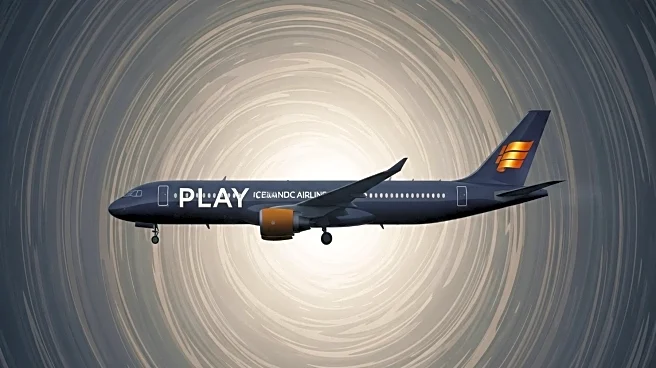What's Happening?
Icelandic budget airline PLAY faced a significant financial challenge as it was due to settle a carbon emissions bill of over 1.6 billion ISK the day after it ceased operations. This payment was part of the EU-wide emissions trading system, which requires airlines to purchase carbon credits to offset their emissions. PLAY's last aircraft left Iceland with an unpaid debt of approximately ISK 500 million. The Environment Agency of Iceland reported that PLAY produced about 165,000 tonnes of carbon dioxide in 2024. The deadline for settling these emissions was September 30, just one day after PLAY announced its closure. The cost of carbon credits is currently over €70 per tonne, which contributed to the substantial bill.
Why It's Important?
The collapse of PLAY and its subsequent financial obligations highlight the challenges faced by airlines in managing environmental responsibilities. The aviation industry is a significant source of greenhouse gas emissions, and the EU's emissions trading system is designed to mitigate this impact. However, the financial burden of purchasing carbon credits can be substantial, especially for budget airlines like PLAY. The situation underscores the financial risks associated with environmental compliance and the potential for severe penalties if obligations are not met. This development may influence other airlines' strategies in managing their carbon footprints and financial planning.
What's Next?
The future of PLAY's financial obligations remains uncertain following its abrupt closure. The airline's inability to meet the carbon credit deadline could result in additional penalties, further complicating any potential restructuring or liquidation processes. The situation may prompt discussions among industry stakeholders and regulators about the sustainability and financial viability of emissions trading systems for airlines, particularly those operating on tight margins. Other airlines may also reassess their environmental strategies to avoid similar financial pitfalls.
Beyond the Headlines
The case of PLAY raises broader questions about the balance between environmental accountability and financial sustainability in the aviation industry. As regulatory pressures increase, airlines may need to innovate and invest in more sustainable technologies to reduce their carbon footprints. This situation also highlights the potential for regulatory frameworks to impact business operations significantly, especially in industries with high environmental impacts.









